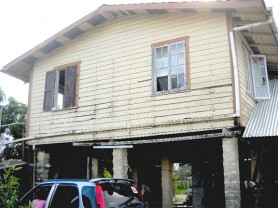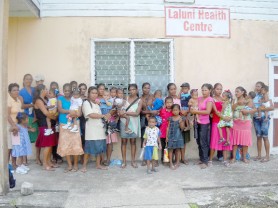…school facing serious problems, CSEC not offered
For over four hours on Wednesday, Lorna Baptiste waited with her baby and two other children for the once monthly medical service provided at the Laluni Health Centre.

At 12:30 pm when the call came that the nurses were not coming, she gathered the children and began the three-mile trek home. So did over a dozen other women who had waited with their babies – some as little as a couple months old – for four and a half hours. “When you sick nobody to look after you,” Baptiste sighed sadly, the sweat caused by the heat, trickling down her face.
In the rural farming community, located along the Linden/Soesdyke highway, medical care is scarce and once every three weeks, a doctor and nurses are dispatched to the health centre so residents can get some help. Most of those who seek this service are mothers with babies and young children. In the past months, the medical team has been arriving very late or not at all, the women complained to this newspaper during a visit to the community on Wednesday. “When they come late, them does hurry, hurry and get vex with you,” one woman said to agreement from the others.

The women said that there had been a nurse stationed at the Health Centre but she has left for training. It is a six-mile trek to the health centre and back home for Baptiste and the other women also travel for long distances with their young children. Baptiste and her three children were there since 8 am hoping to see the doctor early and several other women had been waiting since that time too.
When the call came, the women were told that the team was not coming but no reason was given, this newspaper was told.
The women called for a medical officer to be stationed in the community. “No medicine, nothing you nah get in here,” said one upset young mother. “In here is not a place you can go and catch bus and go [to a medical centre]”, she said.
When contacted on Wednesday evening, Minister within the Ministry of Health, Dr Bheri Ramsaran said he was busy and asked that he be contacted later. He could not be reached yesterday.
Speaking with Stabroek News, several other residents said the quiet agriculture-based community is “left behind” and forgotten. With a population of about 1,200 persons scattered across a wide area, many persons said that the poor state of the main access road is a major hindrance to development. Despite many promises over the years, no repairs were ever done to the road, they said.
Despite the concerns of their elders, children walking to and from school, shout good morning, good day and good afternoon to any passer-by.
The school building is what some of the members of the Laluni Parents Teachers Association are concerned about. One hundred and forty-three children are registered in the nursery and primary divisions of the school. The building housing the school was once a teacher’s quarters. It is not an ideal setting, one parent pointed out.
The school has the bare amenities, there is no library and there is a need for new furniture. Two latrines, built two years ago have fallen into disrepair and are not utilised though students have the use of a small sanitary block. One of the latrines has toppled over. The juice and biscuits feeding programme which was started at the school in the previous term to encourage children to attend school, has not begun for this term, because the school has not received the supplies.
Two years ago, officials promised that the school would be rehabilitated and new furniture provided, but the contract was terminated after problems with the contractor, one parent said. The school has seven teachers including the Head Teacher. Two of the teachers are trained while another is being trained.
Older children have little opportunity to attend secondary schools even though the school performs well in the National Grade Six Assessment, this newspaper was told.
It was explained that the older children attend the upper level of the Primary division, up to Grade Nine and they do not write the crucial Caribbean Secondary Education Certificate (CSEC) examination. Those who had performed well in the Grade Six exam and were assigned schools in the city or elsewhere would go but due to the condition of the road, the transportation costs are prohibitive and often, the children would stop after the first term and return to the village school and after Grade Nine would enter into farming or seek other jobs but this could be difficult since they have not written the CSEC exams, the parents explained. “This is the hurtful part. Teachers make the best effort. Children make the best effort and it is a great setback,” one parent said.
Meantime, the home where the Head Teacher lives has been falling apart but authorities have only “patched” some areas, parents said. They said that the building needs to be rehabilitated. Sections of the front wall are rotting and it offers little protection against rain, they said. It was also pointed out that if another teacher’s home is constructed, teachers could be attracted to the community.





